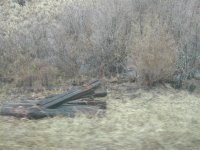 We arrive at the small trackside village of Thicket Portage at about 17.30. I've begun to realise that I am hopeless at identifying trees and plants. I'm ashamed to admit that I even had an extensive 'field' education during my A-level general studies class, in which I studied some of England's woodland. Now I am reduced to bad poetry to try and describe the sometimes barren, sometimes straggly scenery of thin woods and empty lakes.
We arrive at the small trackside village of Thicket Portage at about 17.30. I've begun to realise that I am hopeless at identifying trees and plants. I'm ashamed to admit that I even had an extensive 'field' education during my A-level general studies class, in which I studied some of England's woodland. Now I am reduced to bad poetry to try and describe the sometimes barren, sometimes straggly scenery of thin woods and empty lakes.At Thicket Portage (which I still feel compelled to pronounce alternately in English and French accents... Thikkett Por-tayge or Thiquet Porrr-targe) a native Indian family of five gets on the train and starts playing a game of cards in the restaurant car. A cluster of pick up trucks and quad-bikes have gathered around the open doors of the freight car to collect supplies that have been carried up from The Pas.
Once we leave the small community, the signs of human existence beyond our tracks disappear once more. From time to time I catch sight of old railways sleepers that have been removed and tossed to the sides of the track. Sometimes I glimpse rusting tin cans that might have carried oil or grease. More often than not I see collapsed telegraph poles, long since made obsolete, and now just sinking into the ground or rotting away.
No comments:
Post a Comment